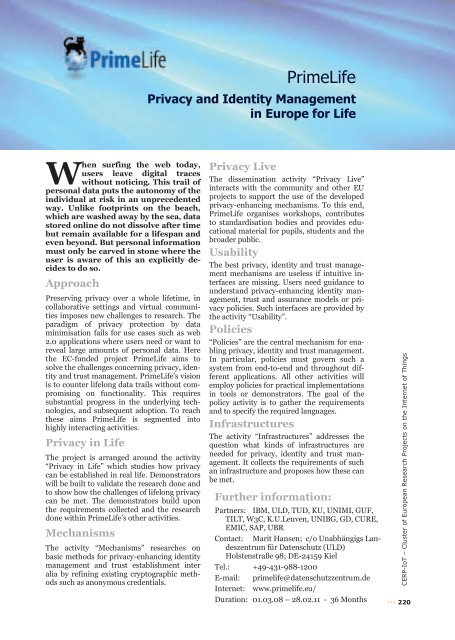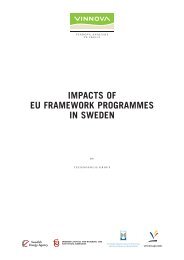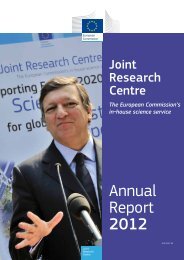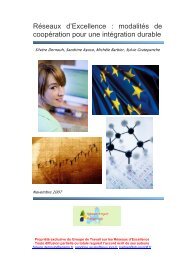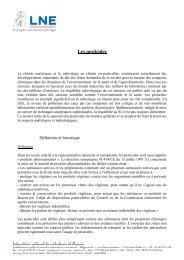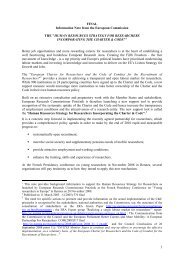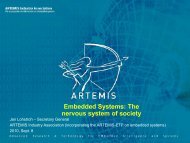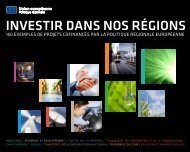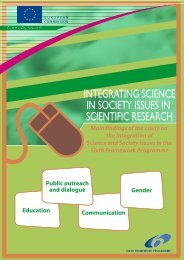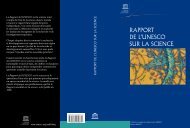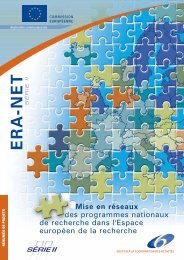Vision and Challenges for Realising the Internet of Things
Vision and Challenges for Realising the Internet of Things
Vision and Challenges for Realising the Internet of Things
You also want an ePaper? Increase the reach of your titles
YUMPU automatically turns print PDFs into web optimized ePapers that Google loves.
W<br />
hen surfing <strong>the</strong> web today,<br />
users leave digital traces<br />
without noticing. This trail <strong>of</strong><br />
personal data puts <strong>the</strong> autonomy <strong>of</strong> <strong>the</strong><br />
individual at risk in an unprecedented<br />
way. Unlike footprints on <strong>the</strong> beach,<br />
which are washed away by <strong>the</strong> sea, data<br />
stored online do not dissolve after time<br />
but remain available <strong>for</strong> a lifespan <strong>and</strong><br />
even beyond. But personal in<strong>for</strong>mation<br />
must only be carved in stone where <strong>the</strong><br />
user is aware <strong>of</strong> this an explicitly decides<br />
to do so.<br />
Approach<br />
Preserving privacy over a whole lifetime, in<br />
collaborative settings <strong>and</strong> virtual communities<br />
imposes new challenges to research. The<br />
paradigm <strong>of</strong> privacy protection by data<br />
minimisation fails <strong>for</strong> use cases such as web<br />
2.0 applications where users need or want to<br />
reveal large amounts <strong>of</strong> personal data. Here<br />
<strong>the</strong> EC-funded project PrimeLife aims to<br />
solve <strong>the</strong> challenges concerning privacy, identity<br />
<strong>and</strong> trust management. PrimeLife’s vision<br />
is to counter lifelong data trails without compromising<br />
on functionality. This requires<br />
substantial progress in <strong>the</strong> underlying technologies,<br />
<strong>and</strong> subsequent adoption. To reach<br />
<strong>the</strong>se aims PrimeLife is segmented into<br />
highly interacting activities.<br />
Privacy in Life<br />
The project is arranged around <strong>the</strong> activity<br />
“Privacy in Life” which studies how privacy<br />
can be established in real life. Demonstrators<br />
will be built to validate <strong>the</strong> research done <strong>and</strong><br />
to show how <strong>the</strong> challenges <strong>of</strong> lifelong privacy<br />
can be met. The demonstrators build upon<br />
<strong>the</strong> requirements collected <strong>and</strong> <strong>the</strong> research<br />
done within PrimeLife’s o<strong>the</strong>r activities.<br />
Mechanisms<br />
The activity “Mechanisms” researches on<br />
basic methods <strong>for</strong> privacy-enhancing identity<br />
management <strong>and</strong> trust establishment inter<br />
alia by refining existing cryptographic methods<br />
such as anonymous credentials.<br />
PrimeLife<br />
Privacy <strong>and</strong> Identity Management<br />
in Europe <strong>for</strong> Life<br />
Privacy Live<br />
The dissemination activity “Privacy Live”<br />
interacts with <strong>the</strong> community <strong>and</strong> o<strong>the</strong>r EU<br />
projects to support <strong>the</strong> use <strong>of</strong> <strong>the</strong> developed<br />
privacy-enhancing mechanisms. To this end,<br />
PrimeLife organises workshops, contributes<br />
to st<strong>and</strong>ardisation bodies <strong>and</strong> provides educational<br />
material <strong>for</strong> pupils, students <strong>and</strong> <strong>the</strong><br />
broader public.<br />
Usability<br />
The best privacy, identity <strong>and</strong> trust management<br />
mechanisms are useless if intuitive interfaces<br />
are missing. Users need guidance to<br />
underst<strong>and</strong> privacy-enhancing identity management,<br />
trust <strong>and</strong> assurance models or privacy<br />
policies. Such interfaces are provided by<br />
<strong>the</strong> activity “Usability”.<br />
Policies<br />
“Policies” are <strong>the</strong> central mechanism <strong>for</strong> enabling<br />
privacy, identity <strong>and</strong> trust management.<br />
In particular, policies must govern such a<br />
system from end-to-end <strong>and</strong> throughout different<br />
applications. All o<strong>the</strong>r activities will<br />
employ policies <strong>for</strong> practical implementations<br />
in tools or demonstrators. The goal <strong>of</strong> <strong>the</strong><br />
policy activity is to ga<strong>the</strong>r <strong>the</strong> requirements<br />
<strong>and</strong> to specify <strong>the</strong> required languages.<br />
Infrastructures<br />
The activity “Infrastructures” addresses <strong>the</strong><br />
question what kinds <strong>of</strong> infrastructures are<br />
needed <strong>for</strong> privacy, identity <strong>and</strong> trust management.<br />
It collects <strong>the</strong> requirements <strong>of</strong> such<br />
an infrastructure <strong>and</strong> proposes how <strong>the</strong>se can<br />
be met.<br />
Fur<strong>the</strong>r in<strong>for</strong>mation:<br />
Partners: IBM, ULD, TUD, KU, UNIMI, GUF,<br />
TILT, W3C, K.U.Leuven, UNIBG, GD, CURE,<br />
EMIC, SAP, UBR<br />
Contact: Marit Hansen; c/o Unabhängigs L<strong>and</strong>eszentrum<br />
für Datenschutz (ULD)<br />
Holstenstraße 98; DE-24159 Kiel<br />
Tel.: +49-431-988-1200<br />
E-mail: primelife@datenschutzzentrum.de<br />
<strong>Internet</strong>: www.primelife.eu/<br />
Duration: 01.03.08 – 28.02.11 - 36 Months<br />
CERP-IoT – Cluster <strong>of</strong> European Research Projects on <strong>the</strong> <strong>Internet</strong> <strong>of</strong> <strong>Things</strong><br />
220


